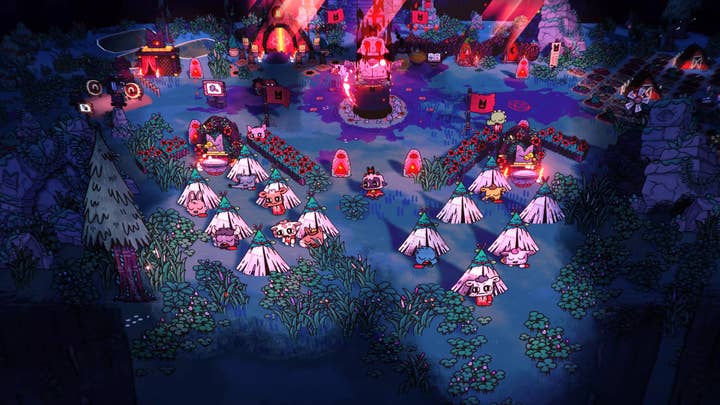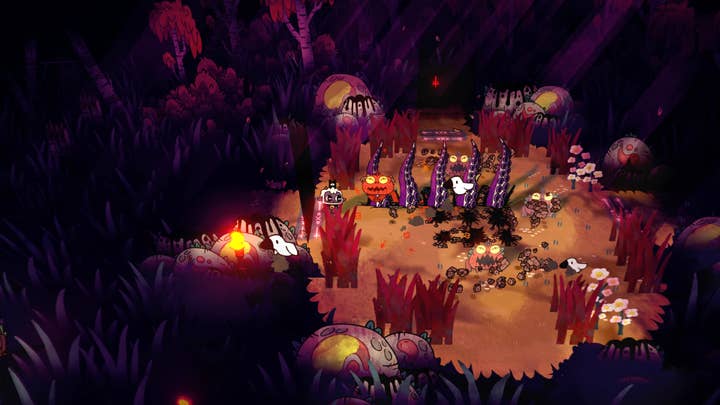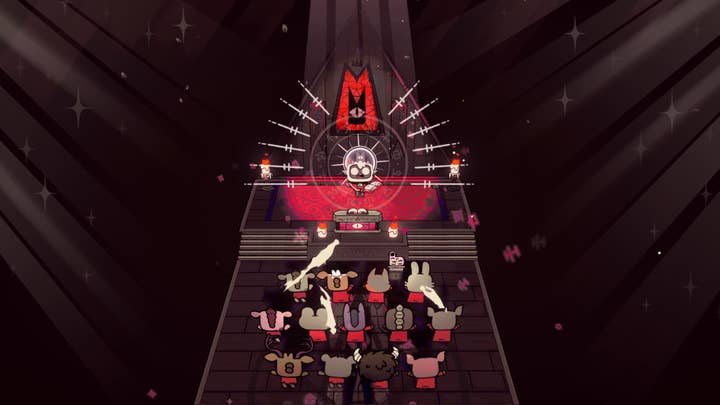Combining cute with the occult in Cult of the Lamb
Game director Julian Wilton discusses the game's origins, mixing genres, teaming up with Devolver, and more
The Australian games circuit has a rich history of turning out great indie titles, such as the BAFTA-winning Hollow Knight, Unpacking and The Artful Escape, to name a few recent entries.
That streak is carried by Cult of the Lamb, a recently-released roguelike from developer Massive Monster that invites players to build a cult as a cartoon lamb. The game combines cute building and light social mechanics with some much sinister themes.
Since its August release, the game has become a critically acclaimed hit, award-winning hit, picking up four wins at the Australian Game Developer Awards (AGDAs) including Game of the Year.

According to creative director Julian Wilton, the decision to take a wicked turn despite the game's cutesy aesthetic stemmed from feedback that suggested the studio's previous games – which include Adventure Pals and Never Give Up – were viewed as games aimed at children.
"I love horror films and occult themes explored in the media, so we started researching ideas there,'' Wilton tells GamesIndustry.biz. "It took us a while to land on a cult theme, but it came together through iteration, as we started off with just the gameplay loop of base building and dungeon crawling.
"The idea for doing something darker came from a direct response from our previous games, which were seen to be a bit like a 'kids game', so we knew with this one we wanted to flick off the light and enter the darkness."
The game explores what it means to 'start a cult', according to Wilton, and he tells us he tried to consume "as much cult media as possible" to nail down what exactly defined a cult.
"Interestingly, a cult and religion are very similar, only differing through the exploitation of power through a leader," he explains. "The difficulty was trying to convert aspects that define a cult into gameplay mechanics, such as exploiting followers."
Wilton adds that there were challenges with trying to combine and balance the roguelike and building elements, as players can choose to do as much or as little of each as they want, which will impact how the game progresses.
"We had to smoosh two games together, and had many difficulties ensuring the gameplay loop worked well, which meant constant iterations," he explains. "We were still updating it six months out of the release, though we used the followers quite a bit as the glue that would hold both sides together."

Cult of the Lamb has a few themes at play. Aside from its sinister beats wrapped up in a jovial art style, it combines roguelike elements of dungeon crawling with the base-building mechanics, two very different styles of gameplay that have different audiences.
"We definitely understood after announcing the game we were attracting the cosy game audience," Wilton says. "We knew that this was a good thing, and we doubled down on it. But did make it quite difficult to balance a game that can be enjoyed by two very different audiences."
Cult of the Lamb is published by Devolver, which is no stranger to oddities and zany game ideas, making it a great fit for the title.
"We would try to explain the game in 50 words, and if we couldn't, we knew the idea was too complicated"
"Marketing was very much ingrained into the ideation process," Wilton says. "We started from the very beginning thinking about who our audience was and how we could communicate with them easily about what our game was. Along with 'hooking' that audience in, we would try to explain the game in 50 words, and if we couldn't, we knew the idea was too complicated.
"We were fairly confident with the pitch. We had already shipped two console/desktop games and were selling to publishers on genres that had done very well," WIlton explains. "We got some early funding from Vic Screen too, which allowed us to really polish up the demo and pitching material."
Wilton adds that with Cult of the Lamb, Massive Monster could sell Devolver on elements of games that had been successful in the past.
"We knew they would be a great partner when we were starting to develop the idea, Jay [Armstrong, Massive Monster co-founder] may or may not have guessed an email address after meeting someone and it led to where we are today."
Massive Monster's founders are based around the world, and the studio also has spaces in the UK and Singapore as well as its Melbourne office. Wilton tells us that most of the talent the studio has worked with is Australian.

"We didn't intend to work with so many Australians, but naturally, I knew many people who would be great to work with because of the lively community," he says.
"Australia's dev scene has a significant cluster of unique game developers. There is a lot of talent with a broad general skillset, meaning it’s more accessible to develop whole games with a more minor team. Having a few breakout hits has definitely spiked a lot of interest too, and having an Australian game can work in your favour when pitching."
Wilton elaborates on pitching tips, and says that the studio learned a lot through building Cult of the Lamb through MVP (minimal viable product) to create a proof of concept.
"I think there is a lot developers can do to 'try' an idea out before they fully commit to it," he says. "This allows you to constantly iterate and improve your game ideas without too much discourse. We would even describe the game to people to see what they would get excited about.Then, if people are getting quite excited by a game idea, you can move to the following stages, where you pitch it to publishers and for grants. This way of working avoids a plunge.
"Instead, you can dip your toes in, and slowly descend into game development's dark depths with less risk."









